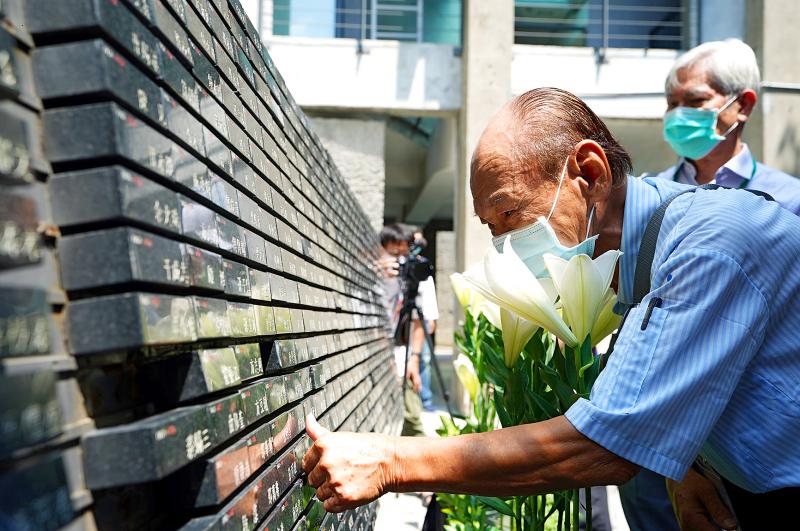The son of a White Terror-era victim, speaking at a memorial event yesterday, said he hoped that Taiwanese would speak up about the era and not forget the previous generation’s sacrifices.
The annual event — which normally takes place the day before the Tomb Sweeping Day holiday and commemorates victims of political persecution — was delayed by the COVID-19 outbreak.
Liao Chih-ping (廖至平), said he was only four years old when his father, Liao Jui-fa (廖瑞發), was arrested during the White Terror era.

Photo provided by the National Human Rights Museum via CNA
“The only image of my father I have in my mind is that of his picture, which was next to his urn in our family living room,” he said.
His family were affected by the accusations leveled against his father even after his father’s death, Liao said, adding that he and other family members were never permitted to talk about his father.
The first time he heard his father being discussed was when his older sister was interviewed last month about the events surrounding their father’s death, he said.
During the interview, his sister talked about going with their mother to identify their father’s body, he said.
Taipei’s National Human Rights Museum invited members of the Taiwan Association for the Care of the Victims of Political Persecution during the Martial Law Period and other non-profit groups yesterday to commemorate family members who were victims of political persecution, and to share their families’ experiences.
Minister of Culture Lee Yung-te (李永得) was unable to attend due to a scheduling conflict with the memorial service of former president Lee Teng-hui (李登輝), but met with the group’s members on Friday and offered his condolences.
Lee said he hoped that the museum would continue its work of uncovering facts about the authoritarian era, and teaching the public about what it finds, so that the era would not be forgotten and history would not be repeated.
Deputy Minister of Culture Kevin Peng (彭俊亨) yesterday said the White Terror era had not only made victims of the roughly 7,000 people whose names are inscribed on the plaque at Taipei’s Jing-Mei White Terror Memorial Park; it also resulted in the destruction of many households.
“Nobody who lived through this history can count themselves as unaffected by it,” he said.

Taiwan is stepping up plans to create self-sufficient supply chains for combat drones and increase foreign orders from the US to counter China’s numerical superiority, a defense official said on Saturday. Commenting on condition of anonymity, the official said the nation’s armed forces are in agreement with US Admiral Samuel Paparo’s assessment that Taiwan’s military must be prepared to turn the nation’s waters into a “hellscape” for the Chinese People’s Liberation Army (PLA). Paparo, the commander of the US Indo-Pacific Command, reiterated the concept during a Congressional hearing in Washington on Wednesday. He first coined the term in a security conference last

Prosecutors today declined to say who was questioned regarding alleged forgery on petitions to recall Democratic Progressive Party (DPP) legislators, after Chinese-language media earlier reported that members of the Chinese Nationalist Party (KMT) Youth League were brought in for questioning. The Ministry of Justice Investigation Bureau confirmed that two people had been questioned, but did not disclose any further information about the ongoing investigation. KMT Youth League members Lee Hsiao-liang (李孝亮) and Liu Szu-yin (劉思吟) — who are leading the effort to recall DPP caucus chief executive Rosalia Wu (吳思瑤) and Legislator Wu Pei-yi (吳沛憶) — both posted on Facebook saying: “I

Sung Chien-liang (宋建樑), who led efforts to recall Democratic Progressive Party (DPP) Legislator Lee Kun-cheng (李坤城), was released on bail of NT$80,000 today amid outcry over his decision to wear a Nazi armband to questioning the night before. Sung arrived at the New Taipei District Prosecutors’ Office for questioning in a recall petition forgery case last night wearing a red armband bearing a swastika, carrying a copy of Adolf Hitler’s Mein Kampf and giving a Nazi salute. Sung left the building at 1:15am without the armband and covering the book with his coat. Lee said today that this is a serious

A mountain blaze that broke out yesterday morning in Yangmingshan National Park was put out after five hours, following multi agency efforts involving dozens of fire trucks and helicopter water drops. The fire might have been sparked by an air quality sensor operated by the National Center for High-Performance Computing, one of the national-level laboratories under the National Applied Research Laboratories, Yangmingshan National Park Headquarters said. The Taipei City Fire Department said the fire, which broke out at about 11am yesterday near the mountainous Xiaoyoukeng (小油坑) Recreation Area was extinguished at 4:32pm. It had initially dispatched 72 personnel in four command vehicles, 16